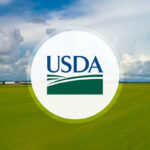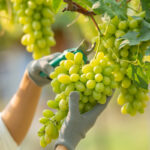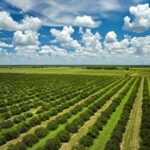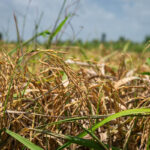Fridays on the Farm: a labor of love for Rhode Island berry, stone fruit farm
March 29 , 2024


Jan and Michelle started out only farming part-time, both working full-time jobs and selling their produce out of small coolers and fresh-cut flowers out of buckets at a few local farmers markets.
They reached their turning point in 1996 and decided it was time to quit their full-time jobs to follow their passion. To become full-time farmers, Jan and Michelle realized they needed to acquire more land.
Purchasing the fields next to their farm, they partnered with the Aquidneck Land Trust to put it into a permanent conservation easement. Under this agreement, sections of the land could be used for farming, while other sections would remain undeveloped. This allowed Sweet Berry Farm to expand its growing area but also earmark space to support the farm operation.
Jan and Michelle have participated in different USDA programs over the years, and Jan says he is especially thankful for USDA programs that have helped the farm recover from losses the farm has suffered due to unpredictable weather.
While their peach trees are insured through federal crop insurance, the Eckharts annually enroll their strawberries, cane berries, cherries, and pumpkins in the Noninsured Crop Disaster Assistance Program with USDA’s Farm Service Agency (FSA) to manage their risk and provide financial assistance when natural disasters result in low yields, loss of inventory, or prevented planting.
Additionally, they have utilized FSA’s Tree Assistance Program to help replant and rehabilitate their peach trees that have been damaged by natural disasters.
To expand the farm, they built a farm stand on the property in 2004 where they sell their farm-grown produce in addition to dairy and gourmet items, prepared foods, and premium ice cream, many of which are sourced from local businesses.
Using sustainable agriculture techniques, they are continuously testing new varieties of fruit and vegetables in search of flavor and natural disease resistance. The farm is also Good Agricultural Practices certified, which is a voluntary program that is offered to the fruit and vegetable industry to verify an operation’s efforts to minimize the risk of contamination of fresh fruits, vegetables, and nuts by microbial pathogens.
“We are always keeping our eye on the future and how we can better serve our visitors,” Michelle said. “We can’t say enough good things about our neighbors, our customers, or our fellow farmers.”
USDA offers a variety of risk management, disaster assistance, loan, and conservation programs to help agricultural producers in the United States weather difficulties in the market and recover from natural disasters as well as invest in improvements to their operations. Learn about additional programs.
For more information about USDA programs and services, contact your local USDA service center.
Leila Naylor is the communications coordinator for the FSA in Rhode Island.









To provide the best experiences, we and our partners use technologies like cookies to store and/or access device information. Consenting to these technologies will allow us and our partners to process personal data such as browsing behavior or unique IDs on this site and show (non-) personalized ads. Not consenting or withdrawing consent, may adversely affect certain features and functions.
Click below to consent to the above or make granular choices. Your choices will be applied to this site only. You can change your settings at any time, including withdrawing your consent, by using the toggles on the Cookie Policy, or by clicking on the manage consent button at the bottom of the screen.
